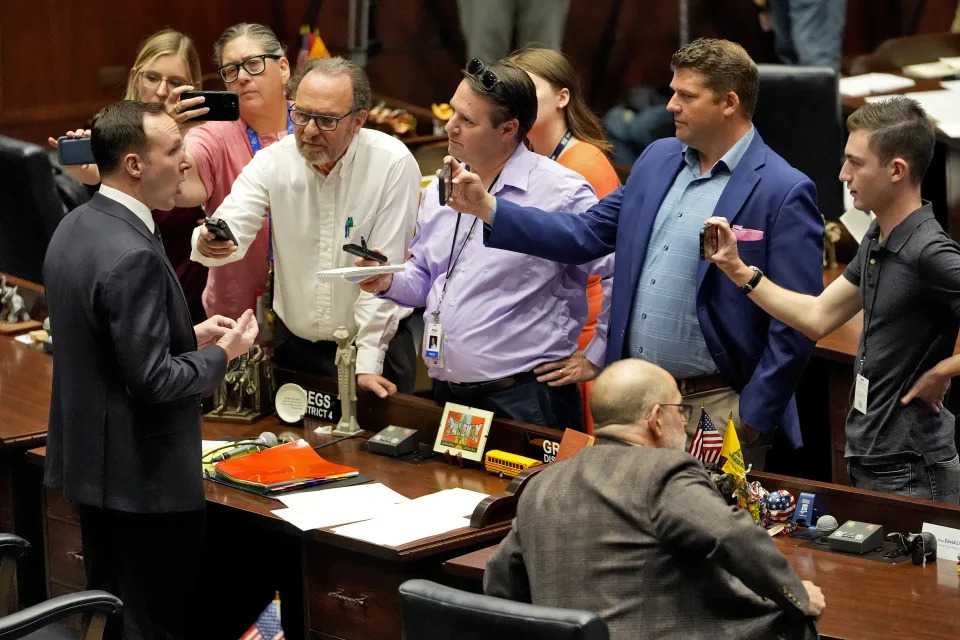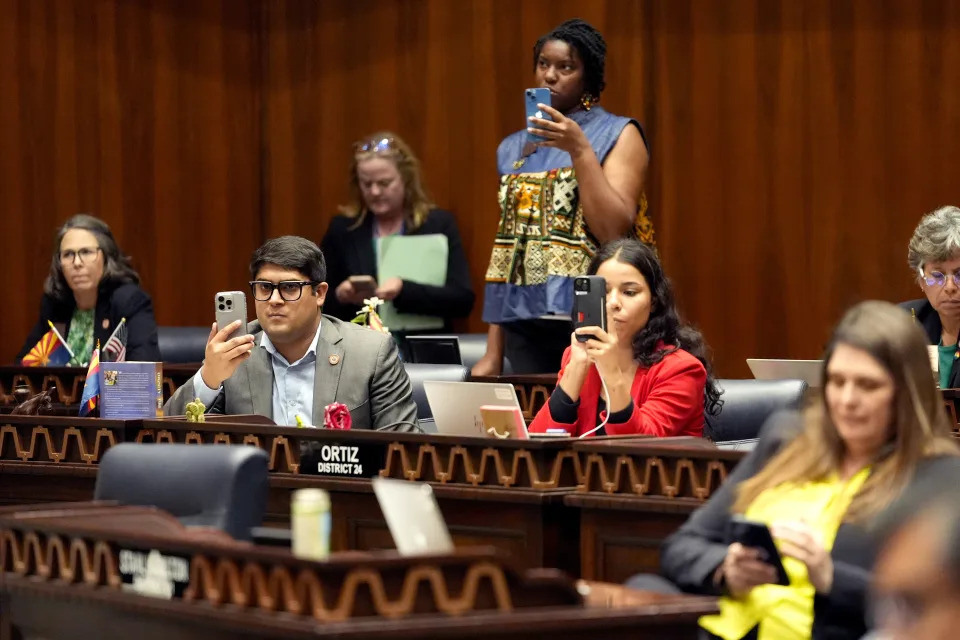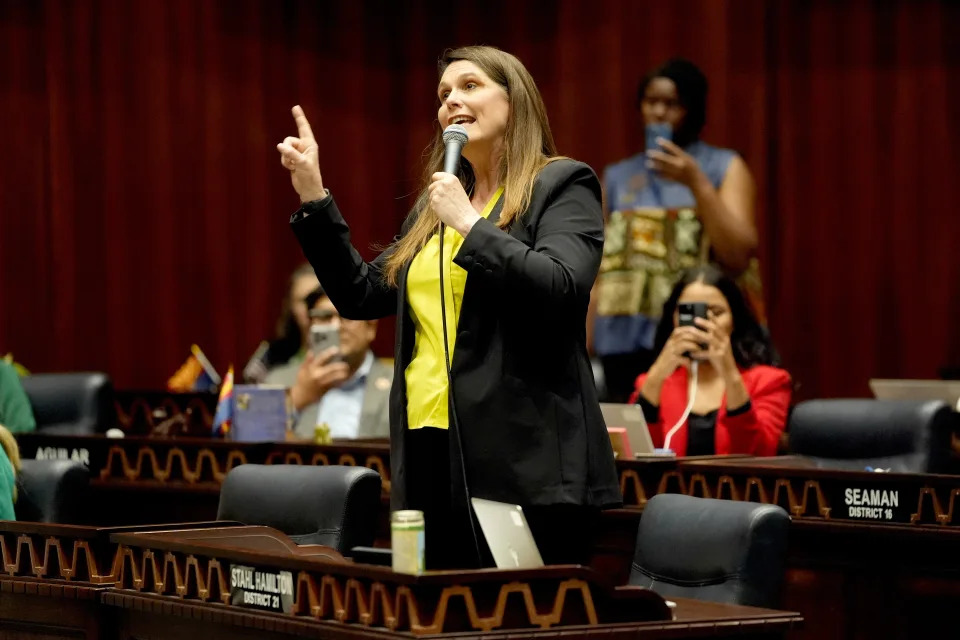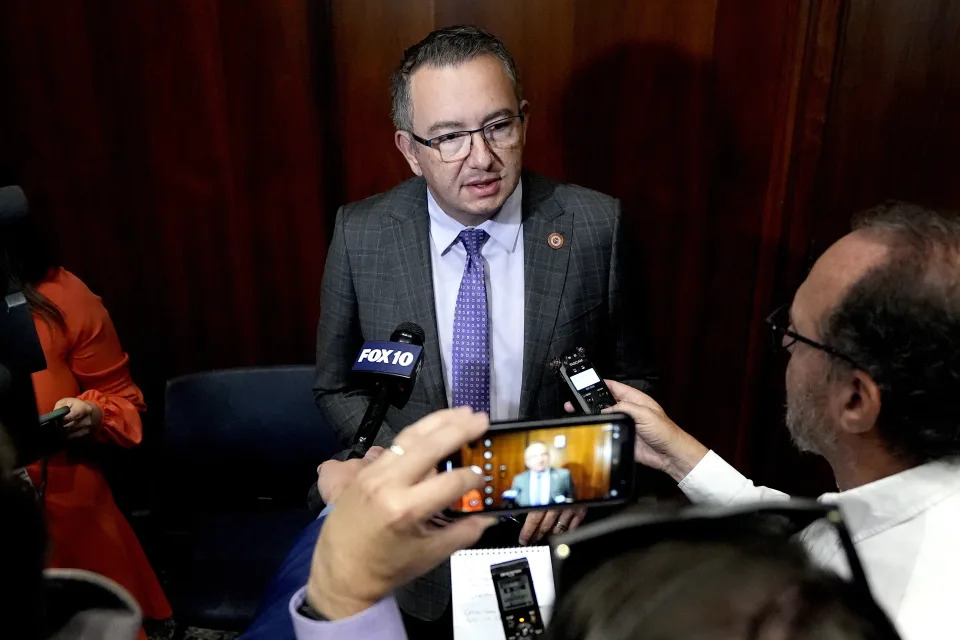ABC News
Arizona abortion ruling, which Democrats decry, splits Republicans and abortion opponents
Libby Cathey and Oren Oppenheim – April 9, 2024
The Arizona Supreme Court’s decision on Tuesday to uphold a near-total abortion ban predating Arizona’s statehood has drawn differing reactions from state Republicans who previously claimed to be “100% pro-life” while both local and national Democrats vowed to push to protect abortion access in one of the most politically important states on the 2024 map.
Vice President Kamala Harris is planning to travel to Tucson on Friday for her “Fight for Reproductive Freedoms,” where she’s expected to continue to squarely blame former President Donald Trump for appointing three of the justices who voted in 2022 to overrule Roe v. Wade’s national guarantees to abortion access.
Since then, efforts to either protect or expand abortion rights have succeeded in both red and blue states around the country when put up directly for a vote.
“Arizona just rolled back the clock to a time before women could vote – and, by his own admission, there’s one person responsible: Donald Trump,” Harris said in a statement on Tuesday.
She argued Trump would sign a federal abortion ban if elected again and “if he has the opportunity,” though Trump this week put out a new statement insisting that he wants to leave the choice to individual states — without specifying what he would do on a national ban.
President Joe Biden, in a statement through the White House, also blasted the Arizona ban, which only has exceptions to save the life of the pregnant woman. Biden called the restrictions “cruel” and the “result of the extreme agenda of Republican elected officials who are committed to ripping away women’s freedom.”
The ban is temporarily blocked pending a trial court decision. Anyone found guilty of violating the ban will face two to five years in state prison.
Republicans, meanwhile, appear to be walking a tightrope on the issue.
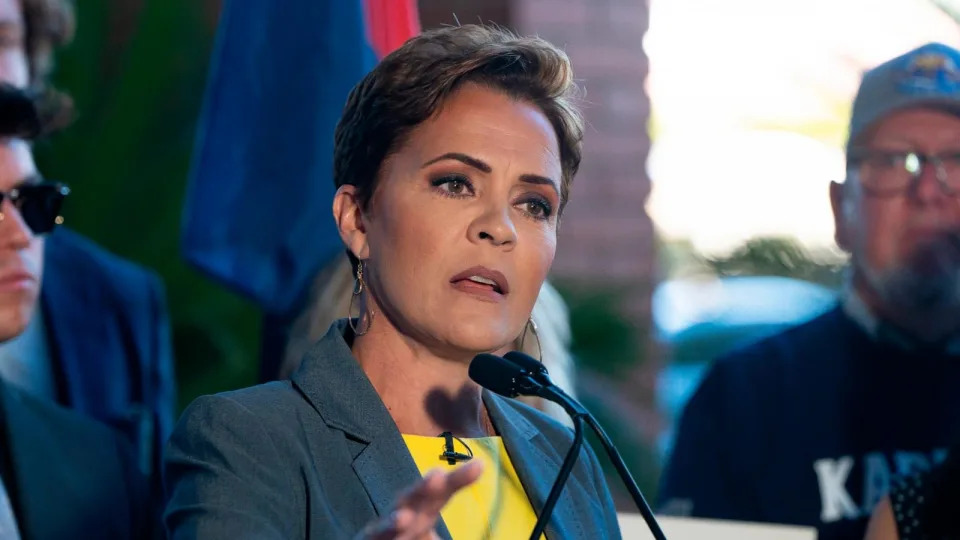
Senate candidate Kari Lake, who narrowly lost the governor’s race in 2022, said she supports Trump’s stance on abortion, that he’d leave it up to states, and claimed she would oppose both “federal funding” and “federal ban[s]” on abortion in the Senate.
“I wholeheartedly agree with President Trump — this is a very personal issue that should be determined by each individual state and her people,” Lake said in a statement Tuesday. “I oppose today’s ruling, and I am calling on [Gov.] Katie Hobbs and the State Legislature to come up with an immediate common sense solution that Arizonans can support. Ultimately, Arizona voters will make the decision on the ballot come November.”
However, Lake also regularly says she’s “100% pro-life” and supports “saving as many babies as possible.”
Asked last month how she would vote on a pro-abortion access initiative if it made it on the ballot in Arizona, Lake dismissed the question to simply say, “I’m pro-life.”
MORE: Trump’s abortion position leaves key questions unanswered on major campaign issue

Freshman Rep. Juan Ciscomani, who represents a swing district, also called Tuesday’s ruling “a disaster for women and providers” — after having praised the U.S. Supreme Court decision against Roe two years ago and after having said he’ll support a preexisting 15-week ban in his state regarding abortion.
“In Arizona, our 15 week law protected the rights of women and new life. It respected women and the difficult decision of ending a pregnancy – one I will never personally experience and won’t pretend to understand,” Ciscomani wrote in a post on X, adding, “I oppose a national abortion ban. The territorial law is archaic. We must do better for women and I call on our state policymakers to immediately address this in a bipartisan manner.”
Former Republican Gov. Doug Ducey posted on social media that the decision was not his “preferred” outcome and urged elected leaders to find “a policy that is workable and reflective of our electorate.” However, Ducey also appointed the four justices who supported the court’s majority in the opinion.
“I signed the 15-week law as Governor because it is thoughtful policy, and an approach to this very sensitive issue that Arizonans can actually agree on,” Ducey wrote on X. “The ruling today is not the outcome I would have preferred, and I call on our elected leaders to heed the will of the people and address this issue with a policy that is workable and reflective of our electorate.”
Republican strategist Barrett Marson called the ruling “ground-shifting” for Arizona politics and argued the decision will reverberate through November’s elections, even if lawmakers do meet in the meantime for a special session to change the law amid public fallout.
“The Arizona Supreme Court ruling may be a huge victory for the pro-life movement in Arizona, it will be short term. The decision will only bring out more voters in 2024 to approve the abortion initiative and likely vote for Democratic candidates,” Marson said in a series of posts on X on Tuesday. “When [Gov. Katie] Hobbs calls a special session to open access to abortion and repeal the 1864 law, Republicans will be in a difficult spot.”
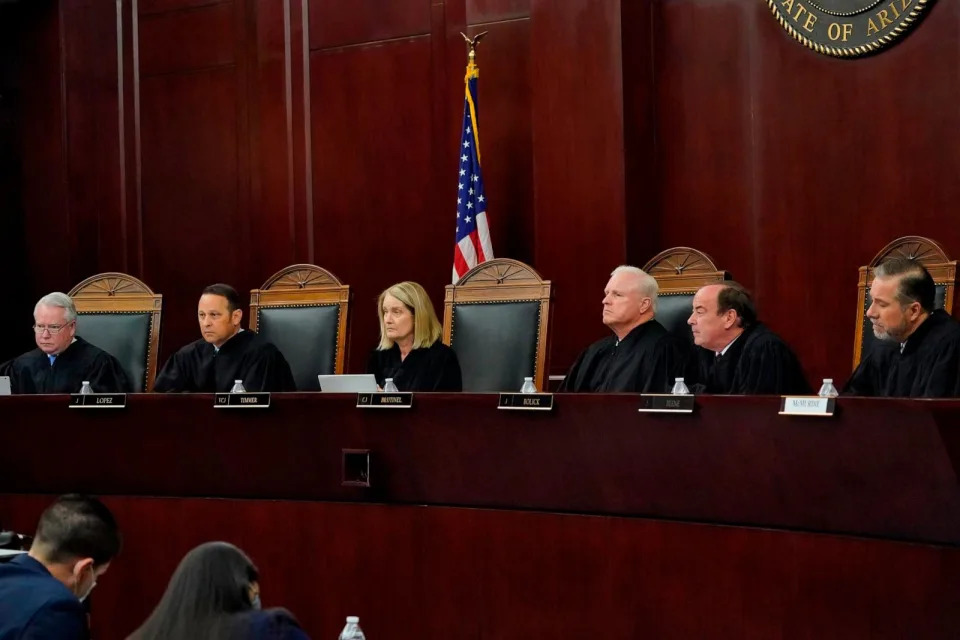
Democratic Rep. Ruben Gallego, expected to face Lake in the Senate race in the fall, seized on her previously calling the pre-statehood ban a “great law” and sent a fundraising pitch to supporters reminding them that as a senator he would vote to end the filibuster rule as a means to protect abortion access nationwide, unlike Lake.
“This is not what Arizonans want, and women could die because of it,” Gallego said in a statement. “Yet again, extremist politicians like Kari Lake are forcing themselves into doctors’ offices and ripping away the right for women to make their own healthcare decisions,” adding he’s “committed to doing whatever it takes to protect abortion rights at the federal level.”
Potential ballot initiative gains momentum
Voters may have a chance to weigh in on abortion access directly in November.
Arizona for Abortion Access, which is working to get a constitutional amendment on the state’s ballot enshrining abortion access, attacked Tuesday’s ruling but said it would motivate more people to join their campaign ahead of the state’s July 3 deadline for signatures.
The proposed amendment would amend Arizona’s Constitution to prohibit the state from legislating against abortion up until fetal viability, around 24 weeks into pregnancy, and enshrines other abortion protections into law.
The group said earlier this month that they had gathered more than 500,000 signatures — surpassing the threshold to get an initiative on the Arizona general election ballot.
“This ruling will put the lives of untold Arizonans at risk and robs us of our most basic rights,” Arizona for Abortion Access campaign manager Cheryl Bruce said in a statement. “Implementing a near-total abortion ban from before women even had the right to vote only further demonstrates why we need politicians and judges out of our healthcare decisions. Now more than ever, our campaign is driven to succeed in passing this amendment and protecting access to abortion in Arizona once and for all.”
The president of Susan B. Anthony Pro-Life America, Marjorie Dannenfelser, who opposes abortion, called the decision an “enormous victory for unborn children and their mothers” and indicated abortion opponents in the state will now work to defeat the ballot initiative.
MORE: Fighting for their lives: Women and the impact of abortion restrictions in post-Roe America
“The compassion of the pro-life movement won in court today, but we must continue to fight,” Dannenfelser said in a statement.
“Governor Hobbs and her pro-abortion allies will pour millions into deceiving the voters about the upcoming amendment that permits abortion on demand when babies can feel pain and survive outside the womb,” she said. We must defeat this extreme measure that would force Arizonans to pay for abortions and eliminate health protections for women.”
Alongside Hobbs, Arizona Attorney General Kris Mayes, a Democrat, said she will not prosecute any abortion providers under the law she deemed “draconian.”
ABC News’ Olivia Osteen contributed to this report.


